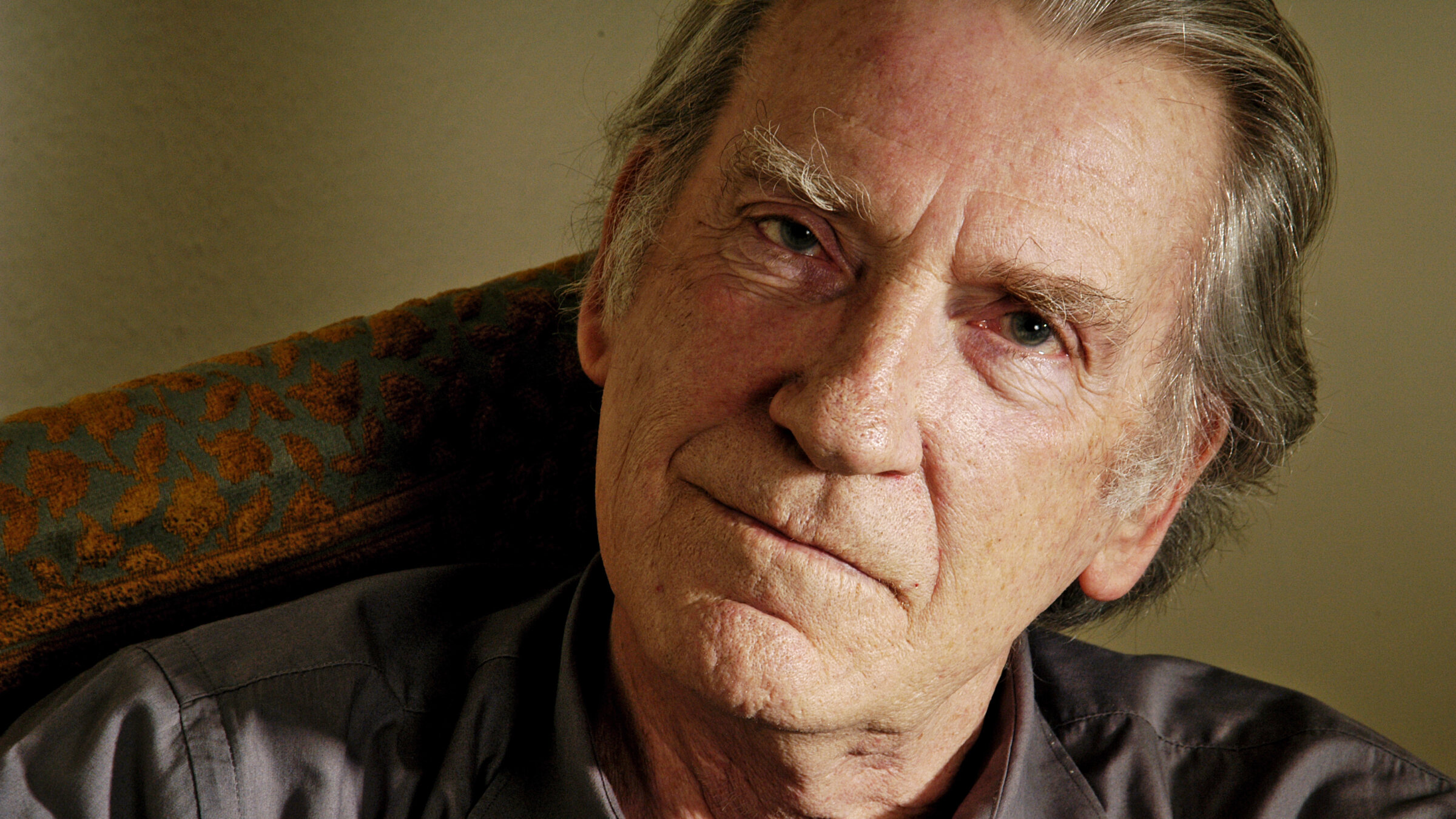How a great Jewish actor made a name for himself by playing antisemites and other villains
David Warner, who appeared in ‘Morgan,’ ‘Time Bandits,’ and a lost film with Bob Dylan, has died at age 80

LONDON – JANUARY 7: David Warner poses during a photo call held on January 7, 2005 at his home in London, England. (Photo by Cambridge Jones/Getty Images)
The English actor David Warner, who died July 24 at age 80, proved that Jewish family tsuris can inadvertently serve as inspiration for a stellar performance career.
Warner played screen villains in “The Omen,” “Time Bandits,” “Titanic,” “Star Trek V, VI and The Next Generation” as well as an atypically benign character in “Mary Poppins Returns.” Yet his employment over the past six decades was based on an indefinable aura of being ill at ease, not fitting in. In most roles, Warner imported his own personal dislocation and torment, so that when his hulky silhouette appeared onscreen with hunched shoulders, audiences immediately sensed a certain disquiet.
Warner’s father was a Russian Jewish-born proprietor of a nursing home in northern England, and with excessive trust in the benefits of institutional care, Warner was sent to eight different boarding schools, where he failed academically. Warner’s father and mother, soon estranged, never married and were constantly feuding. “My parents kept stealing me from each other, so I moved across England a lot,” he told The Guardian. “There was no theatrical tradition [in my family] but plenty of histrionics.”
Small wonder that eccentricity and Yiddishkeit were hallmarks of his performance experience from the start. In 1963, a television play, “Madhouse on Castle Street,” had him costarring with a young Bob Dylan who contributed a new tune, “Blowin’ in the Wind” and other songs to this story about an English boarding house where a lodger locks himself in his room, declaring that he has retreated from the world until changes occur.
Unfortunately, the BBC did not preserve programs after broadcast, and “Madhouse on Castle Street” was scrapped in 1968. A few audio excerpts of Dylan singing are all that remain of this tantalizing achievement.
Warner would achieve prominence in a film by the Czech-born Jewish director Karel Reisz, one of the children rescued from the Nazis by the humanitarian Sir Nicholas Winton (born Wertheim). Reisz, whose parents were murdered at Auschwitz, directed “Morgan: A Suitable Case for Treatment,” a 1966 film in which Warner played a daydreamer who wears an ape suit (Warner himself, ever practical-minded, would only wear an ape suit in future when remunerated for it, in 2001’s “Planet of the Apes”.)
Next was a role in Sidney Lumet’s 1968 adaptation of Anton Chekhov’s “The Sea Gull,” where he played the son of a histrionic mother, incarnated by the French Jewish actress Simone Signoret (born Kaminker). Given the familial discord during his formative years, it is unsurprising that Warner coped with galling parental figures convincingly onscreen, and would do so again in Alain Resnais’ 1977 family drama “Providence,” where he played an astrophysicist with an impossible father figure, a dipsomaniac novelist portrayed by John Gielgud.
Also in 1968, Warner was in John Frankenheimer’s film “The Fixer,” adapted from the novel by Bernard Malamud. The narrative was inspired by the real-life 1913 trial of Menahem Mendel Beilis, a Russian Jew falsely accused of having ritually murdered a Ukrainian boy. Historians see the Beilis case as an example of the notorious Blood Libel ritual murder libel, an antisemitic invention by which Jews supposedly slayed Christian boys to use their blood for religious rituals. “The Fixer” featured Warner as Count Odoevsky, a languid aristocratic Russian minister of justice who offers twisted logic for Tsarist anti-semitic policies.
During the ponderous, if well-acted, movie, Odoevsky/Warner admits that the jailed Beilis character is really innocent, but murmurs, “If our workers and peasants begin to hate the czar, as I fear they do, ultimately they will kill him. Far better that they hate and kill the Jew. In fact, it’s the only patriotic alternative.”
In conversation with the prisoner, who cites Baruch Spinoza to the effect that “where there’s no fight for it, there’s no freedom,” Odoevsky/Warner chimes in with the reminder: “[Spinoza] was a Jew.”

In the supernatural 1976 horror film “The Omen,” written by the Illinois-born Jewish screenwriter David Seltzer and directed by Richard Donner (born Schwartzberg), Warner played an ill-fated demon hunter. While any actor regularly hired to play villains will have a resume filled with tsuris, Warner radiated an almost oppressively ominous quality. So it made sense that he reportedly acted in no fewer than three films involving the RMS Titanic.
Repeatedly cast as a Nazi and/or antisemite, Warner’s employment record in some ways resembled the destiny of Jewish refugee actors from Nazi-occupied countries during the Second World War, doomed to be offered parts associated with the same Germans who had caused them to flee their homelands. Unlike these earlier performers, Warner never used a Teutonic accent for such parts, relying on British tones to convey hauteur and evil.
In 1977, he was in the WWII thriller “Cross of Iron,” directed by Sam Peckinpah, as a disillusioned Nazi officer convinced of the infernal and eternal aspects of war, without an iota of vainglory. In 1978, Warner participated in the impactful miniseries “Holocaust,” playing Reinhard Heydrich, a high-ranking German SS and police official who was a principal architect of the Holocaust. As Warner told interviewer Timon Singh in 2018, “I didn’t want to do it when I was asked to play Heydrich, because he was a real person, responsible for awful things and it really pained [me] doing it. I didn’t want to play it, then I realized that if I didn’t play it somebody else would, and whatever discomfort I might feel playing him is nothing [compared] to the discomfort in history for all [of] his victims.”
Indeed, Warner would portray Heydrich twice, also in the TV movie “Hitler’s S.S.: Portrait in Evil (1985).” Perhaps unexpectedly, as Warner informed Singh, Heydrich reminded him of a torturer in “Star Trek: the Next Generation”: “[Heydrich] was a monster, but he loved classical music, he loved literature, he had a family, he wrote love letters to his wife, and yet, he was one of the most evil men in history.”
Warner’s roles increasingly typecast him as a nogoodnik. In an Emmy-winning turn, he was Pomponius Falco, a snide Roman senator, in the 1981 TV miniseries “Masada.” At one memorable moment, Warner as Pomponius glides into a military camp on a scorching day and grumbles, “So much for atheism! There is a hell! This is it!”
Despite inspiringly sweeping soundtrack music by American Jewish composer Jerry Goldsmith and an all-star cast, this miniseries has not endured in popular memory, possibly because audiences understandably found the subject a downer.
In the 1988 film “Hanna’s War,” based on “The Diaries of Hanna Senesh,” about the much-honored Hungarian Jewish anti-Nazi resistant, Warner was described by a New York Times critic with a Dickensian flourish as “the Uriah Heep of Hungarian Fascists.” And in the enigmatic 1993 miniseries “Wild Palms,” Warner played Eli Levitt, a right wing terrorist.
From his beginnings, Warner was implicated in a world of domestic torment and strife that expanded to a wider canvas of historical grief. Also an acclaimed classical actor, David Warner will doubtless be remembered with appreciation for his dauntless investigations into the iniquity that afflicted 20th century Jews.
























